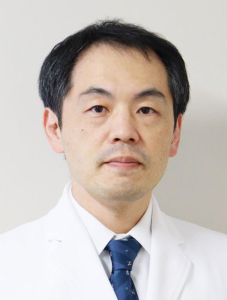Professor Yoichiro Sugiyama,
Department of Otolaryngology–Head & Neck Surgery, Saga University Faculty of Medicine

Have you recently experienced increased coughing while eating or noticed your voice becoming hoarse? These may be signs that essential functions—such as swallowing (“dysphagia”) or voice production—are declining due to aging or illness.
We spoke with Professor Yoichiro Sugiyama of Saga University, who has dedicated his career to throat function. Beyond traditional rehabilitation, Sugiyama is exploring the novel role of oxidative stress in treating dysphagia. We discuss everything from the mechanisms of swallowing and voice to the latest treatment innovations.
― Could you share your career background?
Professor Sugiyama: I graduated from Kyoto Prefectural University of Medicine and immediately specialized in ENT. I gained clinical experience at affiliated hospitals and began swallowing research in graduate school—that was the starting point of my expertise.
I then studied at the University of Pittsburgh for about 18 months as a research fellow. After returning to Kyoto, I worked in ENT until February 2024, before transitioning to my current role at Saga University.
My initial connection to ENT was personal: I suffered from allergic rhinitis as a child and frequently visited ENT clinics. That familiar environment influenced my interest in the field.
Through medical school and clinical rotations, I discovered the wide-reaching scope of ENT—covering ear, nose, throat diseases, and head-and-neck oncology. I was drawn to its depth and breadth.
During graduate school, I chose to specialize in throat functions—particularly swallowing and voice, as well as head-and-neck cancers.
At Kyoto Prefectural, I trained under leading experts such as Professors Hisao Hisashi and Shigeru Hirano. Their mentorship and the functional nature of the field solidified my dedication to this specialty.
Throughout my career, I’ve combined clinical practice and research, allowing clinical insights to inform research and vice versa, deepening my expertise in both spheres.
― Could you explain your specialization in dysphagia and voice function?
Professor Sugiyama: The throat’s critical functions—swallowing and voice—decline due to various factors.
Aging naturally impairs throat function, just as it affects other organs. While voice and swallowing decline is not solely age-related, aging is definitely a significant contributor.
Excessive voice use—particularly among singers or teachers—is another factor. However, it’s not simply usage but the manner of speaking. Forceful, strained voice production damages vocal folds, leading to inflammation, polyps, or nodules.
Swallowing dysfunction is often caused by diseases. In elderly patients, stroke or brain hemorrhage frequently impacts swallowing as a secondary effect.
Since swallowing and voice are brain-controlled, neurological deterioration also impairs function. Dysphagia often involves both throat structures and brain control.
Treatment in this field has evolved dramatically. Even procedures like vocal polyp surgery, voice therapy, and swallowing rehabilitation devices have advanced significantly.
Current main treatments include personalized rehabilitation programs—some intensive over weeks, others extended over years.
One emerging method is neuromuscular electrical stimulation therapy. Though an older concept, new devices show promise in improving swallowing more efficiently. However, it is not yet a widely adopted therapy.
Unfortunately, developing a medication that directly improves swallowing remains extremely challenging.
Dysphagia is complex. Effective treatment requires customizing combinations of rehabilitation, electrical stimulation, and surgery based on each patient’s condition.
― How does oxidative stress relate to your field?
Professor Sugiyama: My interest in oxidative stress and antioxidants began in the voice domain. Mechanical stress from excessive voice use leads to inflammation and vocal fold fatigue, and studies suggest oxidative stress plays a role. I wondered if antioxidant therapy could be effective.
I considered extending this concept to swallowing—both voice and swallowing involve repeated throat movement, so common mechanisms likely apply.
We are investigating two angles: first, oxidative stress as a driver of conditions causing dysphagia, such as stroke. Second, secondary oxidative stress from repeated pneumonia or muscle weakening after dysphagia.
This line of research began during my time at Kyoto Prefectural University, where I first met Dr. Haruhiko Inubo. Our discussions deepened my understanding of oxidative stress, antioxidant capacity, and the potential of antioxidant supplements.
When I first examined Twendee X’s formula, I was struck by how precisely the components were balanced. Its high antioxidant efficacy is far beyond typical supplements.
We are now considering antioxidant strategies not only for dysphagia but also for other ENT disorders—such as allergic rhinitis and treatment-resistant eosinophilic sinusitis—where oxidative stress may play a role.
Given the complexity of dysphagia treatment, combining rehabilitation with antioxidant approaches could offer a powerful new option. We are evaluating this from both clinical and research perspectives.
― What principle guides you as a researcher?
Professor Sugiyama: I emphasize “avoiding prejudice.” Research outcomes are unpredictable; starting with a predetermined conclusion and seeking confirmation is not productive.
I focus on rigorous methodology: designing experiments so that results can be trusted—and then accepting the outcome impartially. That approach allows real learning—even if results differ from initial assumptions.
Great discoveries often come from unexpected results. Pursuing curiosity and adjusting hypotheses respectfully is key. Research isn’t about leaps but steady progress—adding one piece at a time.
We covered the science of swallowing and voice, and how oxidative stress offers a fresh perspective. Professor Sugiyama’s commitment to impartial inquiry and openness to new approaches shines through.
By integrating antioxidant approaches into established therapies, there is potential to bring hope to many people living with dysphagia. We look forward to the continued growth of his research.

Department of Otolaryngology–Head & Neck Surgery, Saga University Faculty of Medicine
5‑1‑1 Nabeshima, Saga City, Saga Prefecture 849‑8501, Japan
http://www.ent.med.saga-u.ac.jp/